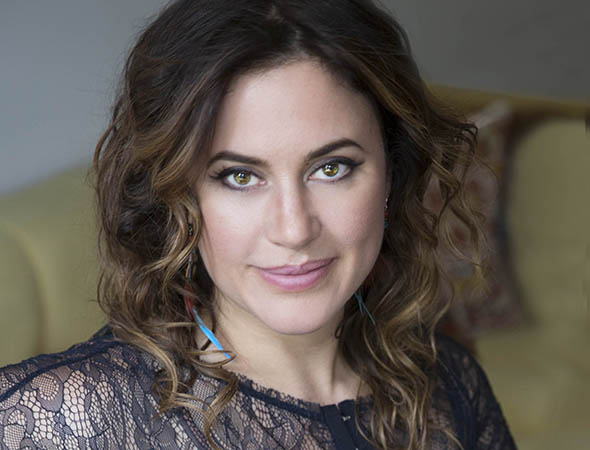When it comes to entrepreneurship, Katrina walks the walk. From her own background as a baker starting in her teens, to her passion for the innovation that results from technology like social media, her drive and inspiration define the spirit of entrepreneurship. But what really gives her away is the fact that creating an amazing and successful product in Vosges Chocolate (my favorite is the Black Salt Caramel bar, what's yours?!) wasn't enough. Now she's supporting American high school and college women in their own food business dreams through Wild Ophelia. Learn more and apply to receive a Wild Ophelia grant by March 31, 2017.
When did you know that you wanted to work in food?
I never loved chocolate as a kid., but I did have a passion for baking. When I was six years old, I had an easy bake oven and I opened my first business selling cakes out of my garage. I got a lot of pleasure out of those experiences. So, in high school, I ran a cake company. I found that creating beautiful food brought a lot of love into my life and that feeling was addictive. So addictive that as I entered college at Vanderbilt University, I continued to cook and bake for my entire sorority every Monday evening.
I had my first meaningful chocolate experience in the Place des Vosges, in Paris. I went to this restaurant called L'Ambroisie and they had taken chocolate ganache, frozen it, dipped it in a beignet batter and fried it. It was an unforgettable experience of eating this donut-crusty exterior and, when you bit down, this molten explosion of chocolate.
Unbeknownst to me, all of these experiences were fundamental in shaping both my career and my desire to launch the Wild Ophelia Accelerator Program, which encourages and educates young women with entrepreneurial dreams in food. Through the program, we provide three ambitious girls who have started a small business (like my cake business) the funds and mentorship needed to establish themselves.
How did you get your current good food job?
After graduating from Vanderbilt, I moved to Paris to study culinary arts at Le Cordon Bleu. But it wasn't until I returned from abroad and moved to Dallas to get a job with my uncle that I realized there was no innovation going on in chocolate. My uncle wanted me to find chocolate for his store catalog, and everything was just loaded with sugars and artificial flavorings and extracts and wax, and there was no story. I had all these spices from my travels, and I went into my kitchen that night and made a curry and coconut truffle. Everything made sense in that moment: there was this illuminated path that said "just use chocolate as a medium to tell stories." I ended up working on 20 different flavor profiles that night ? saffron with white chocolate and sugar crystals to represent Gaudi's mosaic work, a Hungarian paprika and chocolate ginger ? all based on my travel experiences. The next day, I went into work and brought this collection of chocolates. Dallas in 1997 was still very much a BBQ town, and these people were like "I am not trying that curry thing." I got one woman to try it. She took a bite and her face went from disgust and worry to awe and surprise to "Oh my God, this is actually good." Then she said, "Let me try wasabi." She became totally open to trying everything, and watching that transformation was incredibly exciting.
How did your previous work or life experience prepare you for a good food job?
My worldwide travels were and remain the inspiration for my business and part of my creative process. After graduating from Le Cordon Bleu, I took an apprenticeship in Spain under chef Ferran Adrià and then continued east through Southeast Asia and Australia. My travels have opened my eyes to indigenous spices, flowers, roots, herbs and liqueurs. I use chocolate as the medium to create a sensory experience that nurtures awareness of and appreciation for the world's diverse cultures.
What was the greatest obstacle you had to overcome in pursuing your Good Food Job dream?
Learning how to grow and expand the business while staying true to the brand mission and core values isn't always easy. The true reason I wanted to start Wild Ophelia, besides the desires to experiment with more American ingredients, tell the stories of farmers and purveyors in the United States, and create products that were easily accessible, was to truly give back and support young female entrepreneurs - to give them the foundation and resources to create their own food company.
Name one positive thing that a former employer taught you that you continue to appreciate?
I know this seems cliché, but my biggest mentor is my mother, hands down. To this day, she is still a guiding force in my life and my business. Her confidence and positive energy, her insistence that dreams will manifest if you believe, guide me daily.
What can you identify as the greatest opportunities in food right now?
I think now more than ever young people are experimenting with food and I think social media has a lot to do with it. It's hard to get on Facebook without seeing a bunch of 60-second recipe videos, and I think it's great. I love the idea of people breaking away from traditions and just doing their own thing.
If you could be compensated for your work with something other than money, what would it be?
Free travel. Traveling is one of my favorite things. It's where I pull most of my inspiration and it also helps me refocus and center my thoughts.









